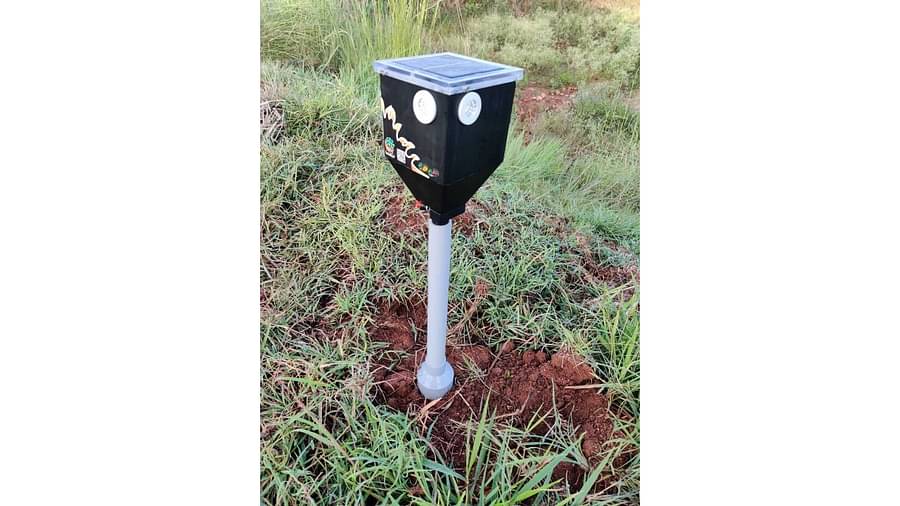Each device features four LED lights. The lights are positioned in pairs, in such a way that from a distance they look like a pair of glowing eyes of a predator, founder S R Ayan said.

A Bengaluren has designed a lighting system to help farmers protect their crops and livestock from wildlife, during the night. The innovative product does not harm the wild animals. Katidhan, a five-member startup located on New BEL Road, recently won an investment of Rs 1.5 crore on business reality show, Shark Tank India.
On the show, its founder S R Ayan said farmers in India lose 30-50% of their crops to wildlife. The conventional methods to keep wild animals out include installing electrical fences, planting crude bombs or spraying chemicals. Citing the dangers of such interventions, he said an elephant in Chikkamagaluru died due to electrocution by an electric fence last November.
Ayan says his product, Parabraksh, mitigates the human-animal conflict in a “humane way”. Animals are afraid of other animals and the lighting system is built around this behavioural psychology. “Each device features four LED lights. The lights are positioned in pairs, in such a way that from a distance they look like a pair of glowing eyes of a predator. This scares away the animal.”
The product flashes light in random patterns. Being an autonomous device, it switches on in the dark and switches off as daylight breaks. It runs on solar power but also features a USB charging port for backup.
“Four such lights are needed to protect a farm land of 1 hectare, one in each corner. You can mount them on bamboo sticks or steel poles. The height of the stick or pole will depend on the size of the animal you are targeting,” Ayan adds.
He claims Parabraksh is “over 95%” effective in repelling wild boar, nilgai, elephant, tiger, leopard, and the Himalayan bear. He shares case studies: When these lights were uninstalled from a farm in Tamil Nadu and sent for servicing, elephants returned. For a woman farmer in Maharashtra, crop losses due to wild boars have gone down by 25%. The income of a farmer in Odisha has doubled since elephant invasion stopped.
Ayan says the demand for Parabraksh was more than what his bootstrapped startup could meet, that’s why he decided to raise funds through investors.
It all started with a friend’s SOS call in 2017. “My friend was volunteering with a wildlife organisation in Ladakh. He said villagers were trying to kill the snow leopard that was attacking their livestock. He knew about my background in product design and robotics and asked if I could help,” the 33-yearold recalls.
After a pilot in Ladakh, Parabraksh hit the market in 2020. “Our first taker was a large coffee estate in Kodagu,” he says. About 1,100 units, Rs 9,500 apiece, have been sold since. A majority of the products have been sold to farming and social development collectives in Maharashtra.
“After the show, I am getting enquiries from Kanakapura, Kodagu and Hassan, which see regular elephant movement,” he says.
Monkey chaser
Sensor-based Kapikaat is another product by Katidhan, priced at Rs 5,000 and up. It emits loud sounds to repel monkeys during day time. “It is 70-75 % effective. We reckon that monkeys can get used to the source of the sound and ignore it,” says Ayan.
source: http://www.deccanherald.com / Deccan Herald / Home> India> Karnataka> Bengaluru / by Barkha Kumari / March 27th, 2024

